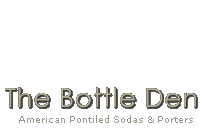Research Reveals Earlier Timeline for Flavored Sodas...
Article II - The Alcock Display Ad |
back to Articles
by Wil Martindale
Some time ago, it was written that Eugene Roussel, the Philiadelphia soda water manufacturer "introduced" the idea of adding flavored syrups to carbonated waters. He is sometimes credited as being the first to market flavored soda waters.
Because Roussel was prolific, and a pioneer of the "soda fountain", evidence of his early efforts is abundant enough to establish him as producing flavored carbonated beverages as early as 1838, and perhaps even bottling them in open-pontiled, aqua vessels, finished with the tell-tale "short tapered top" of the late 1830's and early 40's.
Quite a bit of evidence has since surfaced, which indicates that Roussel was actually one of several early innovators in the flavored soda water industry. We know that early bottlers like Elias Durand bottled "mineral waters" possibly before 1827, and new evidence regarding American Egg minerals reveals the production of an American embossed egg as early as 1818. But as far as flavored syrups being added to carbonated waters, what evidence do we have that establishes the earliest lineage of the flavored "soda pop" idea?
How about this display ad for "Dr. E. J. Alcock", recently discovered in the 1829 Matchetts Baltimore Director:
This may be the earliest evidence that, at least in the city of Baltimore, the idea of "MINERAL WATERS with all kinds of FRUIT SYRUPS, in their season" was already popular enough to advertise to the general public - before 1830.
Even more enticing are the next statements, "SODA WATER, bottled to order. Also, Syrups in bottles, &c."
What types of bottles was Dr. Alcock using for his soda water and fruit syrups, and was he pre-mixing syrups into these bottled waters, as this advertisement seems to indicate?
Despite any lack of embossed bottles bearing his name, the advertisement establishes a much earlier date than 1838 for the introduction of flavored soda or mineral waters for public consumption. Who knows what further evidence may be uncovered to support an even earlier date than 1829?
On a side note however, this finding brings up another point which is long overdue in making. Druggists were in large part the early innovators of the soda water manufacturing industry. Time and time again we find that it is the early druggists who first dabbled in the manufacture of carbonated waters - establishing the health benefit connection to natural mineral waters, which predates the 1800's in America. The provision of pure carbonated waters and their related health benefits establishes Roussel and Durand in Philadelphia, Alcock in Baltimore, Finley & Phinn in Charleston, as purveyors not only in medicines, perfumes and dyes, but also in healthful, pure carbonated waters - both artificially and naturally created, in some cases.
This is why we see bottles embossed "aerated, medicated waters" and also why druggists in particular (like Simes, Reynolds and Hubbell) eventually established their own trademark "drug store" form in the later 1850's. We often see early soda, torpedo and other forms embossed with names usually associated with the Chemist and Pharmaceutical / Druggist trade: Merchant in NY, Blair in Philly, Stewart in Baltimore, Heimstreet in Albany, Adams in St. Louis, and so on.
The crossover between chalybeate waters and other natural mineral waters with laxative properties propels us into the domain of the citrate, which then opens up an entire world of thick walled, iron pontiled cylinders, embossed with Druggists names and addresses--similar in shape and style to the drug store soda form, sometimes losing their distinction (as with the iron pontiled Blair cylinder--is that a drug store soda or an early citrate?) and then finally taking us back full circle to the earliest American egg mineral--Cullen's liquid "magnesia", circa 1818.
When you take all that into consideration, the medicinal connection to soda waters, and the early druggists that manufactured them seems fairly clear.
The addition of fruit syrups may mark the establishment of fruit flavored beverages (soda pop) - but it still appears that Druggists may in fact be credited as the originators of that idea. And if Coca Cola, that refreshing cocaine-laden headache tonic from the 1880's is any indication, the idea of a Druggist inventing a medicated "pop" product and bringing it to market was a pretty good one.
